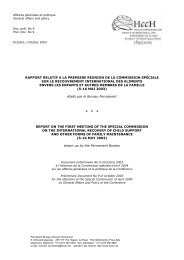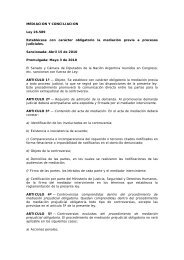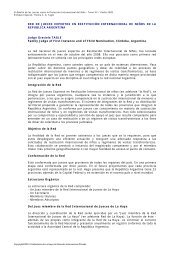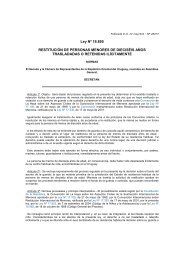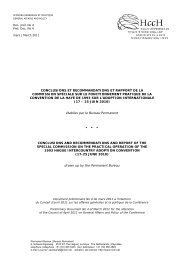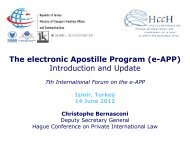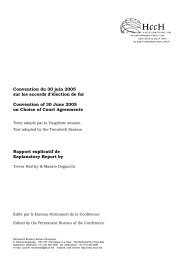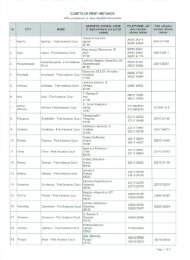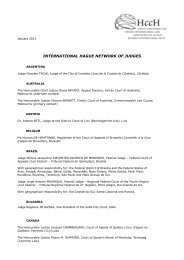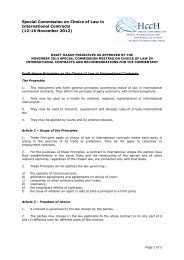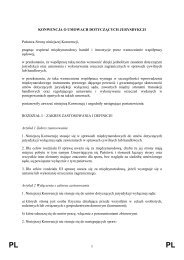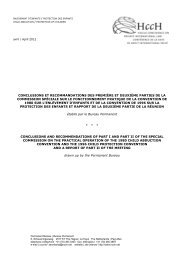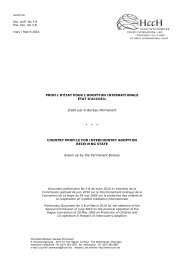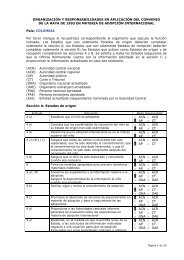- Page 1 and 2: Obligations alimentaires Maintenanc
- Page 3 and 4: TABLE DES MATIÈRES / TABLE OF CONT
- Page 5 and 6: ANNEXE II LISTE DES ETATS NON-MEMBR
- Page 7 and 8: PARTIE II QUESTIONS CONCERNANT LES
- Page 9 and 10: Nature de la décision relative à
- Page 11 and 12: date of decree absolute. There is n
- Page 13 and 14: FINLAND Maintenance to a child The
- Page 15 and 16: critère de l’insuffisance des mo
- Page 17 and 18: 1 (d) Under Part VIII of the Family
- Page 19 and 20: En revanche, des décisions adminis
- Page 21 and 22: periodical payments or lump sum pay
- Page 23: UNITED STATES OF AMERICA (a) Mainte
- Page 27 and 28: GERMANY Direct relatives are entitl
- Page 29 and 30: Section 10 of the same Act addresse
- Page 31 and 32: Les autres personnes prévues par l
- Page 33 and 34: 3 Quelle est votre définition d'un
- Page 35 and 36: CROATIA Under the Family Act, paren
- Page 37 and 38: NEW ZEALAND “Dependent child” i
- Page 39 and 40: UNITED KINGDOM - SCOTLAND For the p
- Page 41 and 42: Under the private international rul
- Page 43 and 44: ) the court will, when the matter r
- Page 45 and 46: THE NETHERLANDS The 1973 Hague Conv
- Page 47 and 48: U.S.C. §§ 654(4), (6), (32), and
- Page 49 and 50: question of maintenance arises in c
- Page 51 and 52: THE NETHERLANDS The amount payable
- Page 53 and 54: BULGARIE Si le demandeur ou le déf
- Page 55 and 56: FRANCE Les juridictions françaises
- Page 57 and 58: In case the plaintiff lives abroad,
- Page 59 and 60: 7 La procédure relative à une dem
- Page 61 and 62: When a divorce proceeding is pendin
- Page 63 and 64: tat-3 ta’ Gunju, 1987 v Carmelo C
- Page 65 and 66: Méthodes de calcul des aliments Me
- Page 67 and 68: circumstances. Taken into account f
- Page 69 and 70: In court practice, guidelines and t
- Page 71 and 72: The financial factors relevant to y
- Page 73 and 74: NORWAY (h) Where the child has atta
- Page 75 and 76:
SWEDEN It is based on legal criteri
- Page 77 and 78:
At a minimum, federal law requires
- Page 79 and 80:
(b) When the respondent resides abr
- Page 81 and 82:
NEW ZEALAND See above. If the payin
- Page 83 and 84:
10 La méthode de calcul des alimen
- Page 85 and 86:
The criteria for calculating mainte
- Page 87 and 88:
POLAND If a child is entitled to ma
- Page 89 and 90:
UNITED STATES OF AMERICA The Title
- Page 91 and 92:
GERMANY Also the question as to whi
- Page 93 and 94:
the circumstances, for the reasonab
- Page 95 and 96:
POLAND The national law of the pers
- Page 97 and 98:
No generally, there must be a new a
- Page 99 and 100:
GERMANY There is no automatic repea
- Page 101 and 102:
SWEDEN No. UNITED KINGDOM - ENGLAND
- Page 103 and 104:
BULGARIE « A la suite d'un changem
- Page 105 and 106:
LUXEMBOURG En règle générale, le
- Page 107 and 108:
UNITED KINGDOM - SCOTLAND See quest
- Page 109 and 110:
Please see 8 and 11 above. CYPRUS W
- Page 111 and 112:
case) taken place in the circumstan
- Page 113 and 114:
The criterion for variation is “t
- Page 115 and 116:
support orders shall be modified if
- Page 117 and 118:
Same as a domestic decision provide
- Page 119 and 120:
A signaler un problème particulier
- Page 121 and 122:
LDIP prévoit des règles de compé
- Page 123 and 124:
AUSTRALIA Under the Child Support (
- Page 125 and 126:
DENMARK The provisions on the deter
- Page 127 and 128:
Pour le surplus, il est difficile e
- Page 129 and 130:
habituelle de l’enfant au moment
- Page 131 and 132:
CANADA Dans les provinces et territ
- Page 133 and 134:
A demand for maintenance for a chil
- Page 135 and 136:
LUXEMBOURG Voir question 16. MALTA
- Page 137 and 138:
SWEDEN If the child's mother is mar
- Page 139 and 140:
contact between the parties; or (2)
- Page 141 and 142:
Expert proofs consisting of biologi
- Page 143 and 144:
own legal costs, unless the court f
- Page 145 and 146:
Voir question 16. MALTA According t
- Page 147 and 148:
PANAMA Procedures to establish pate
- Page 149 and 150:
In the courts application for maint
- Page 151 and 152:
19 La reconnaissance et l'exécutio
- Page 153 and 154:
DENMARK (a) Danish authorities may
- Page 155 and 156:
155 or the National Office decides
- Page 157 and 158:
Legal and administrative aid and as
- Page 159 and 160:
CZECH REPUBLIC The petitioner is ex
- Page 161 and 162:
- celui du requérant résidant à
- Page 163 and 164:
MALTA a. • The benefit of legal a
- Page 165 and 166:
• a) L’art. 290 CC prévoit une
- Page 167 and 168:
AUSTRALIA Different guidelines appl
- Page 169 and 170:
La déclaration de ressources n’e
- Page 171 and 172:
In accordance with section 1716 of
- Page 173 and 174:
THE NETHERLANDS - NEW ZEALAND The o
- Page 175 and 176:
UNITED KINGDOM - ENGLAND AND WALES
- Page 177 and 178:
Assistance from the state child sup
- Page 179 and 180:
ISRAEL The difference lies in the f
- Page 181 and 182:
SLOVAKIA The Centre does not provid
- Page 183 and 184:
the expertise of the lawyer retaine
- Page 185 and 186:
Fees and expenses are summarised in
- Page 187 and 188:
The legal fees differ only by means
- Page 189 and 190:
In respect of applications/claims f
- Page 191 and 192:
esidential/custodial parent is in r
- Page 193 and 194:
FRANCE - GERMANY In accordance with
- Page 195 and 196:
child support owed to the obligee h
- Page 197 and 198:
enables an enforcement of the judgm
- Page 199 and 200:
LUXEMBOURG Quel que soit le débite
- Page 201 and 202:
sheriff´s officer (we have a paral
- Page 203 and 204:
CANADA Il n’existe pas d’entent
- Page 205 and 206:
the European Community in the Recog
- Page 207 and 208:
27 Quelle sont les procédures en v
- Page 209 and 210:
CROATIA In either case the law prov
- Page 211 and 212:
prior to the time the award was mad
- Page 213 and 214:
SLOVAKIA The procedures do not diff
- Page 215 and 216:
Finally, where a liability order ha
- Page 217 and 218:
- Court imposed fines; - Demanding
- Page 219 and 220:
FRANCE Voir question 27. GERMANY Re
- Page 221 and 222:
It is to be stated that under the C
- Page 223 and 224:
223
- Page 225 and 226:
• disqualification from driving -
- Page 227 and 228:
When the Bailiff´s Office carries
- Page 229 and 230:
charges per month. Some accounts ca
- Page 231 and 232:
Some states incur no costs other th
- Page 233 and 234:
ISRAEL No. JAPAN Various methods of
- Page 235 and 236:
UNITED KINGDOM - SCOTLAND No, they
- Page 237 and 238:
- CANADA • Difficultés d’obten
- Page 239 and 240:
239 his or her request by sending h
- Page 241 and 242:
Au niveau de l’assistance judicia
- Page 243 and 244:
POLAND The most important shortcomi
- Page 245 and 246:
4. The New York Convention deals wi
- Page 247 and 248:
32 Veuillez énumérer toutes les l
- Page 249 and 250:
FINLAND Please, read the answer to
- Page 251 and 252:
NEW ZEALAND See 31 above. NORWAY In
- Page 253 and 254:
UNITED KINGDOM - SCOTLAND The major
- Page 255 and 256:
AUSTRALIA (a) Very High, without co
- Page 257 and 258:
CZECH REPUBLIC We consider the summ
- Page 259 and 260:
m) The procedure should be such tha
- Page 261 and 262:
equest from the public body of the
- Page 263 and 264:
(h) We do not believe this provisio
- Page 265 and 266:
(b) The procedure relating to recog
- Page 267 and 268:
(j) To develop standard forms suita
- Page 269 and 270:
(m) Others - desirable. - Keep addi
- Page 271 and 272:
(e) It would be useful to list the
- Page 273 and 274:
273 -- The instrument could provide
- Page 275 and 276:
CHILE (a) All. (b) None. (c) Yes. C
- Page 277 and 278:
(a) All areas marked at Question 33
- Page 279 and 280:
SLOVAKIA (a) Core elements: I,II ,V
- Page 281 and 282:
-- Transfer-of-funds provisions (hi
- Page 283 and 284:
GERMANY N/A. ISRAEL - JAPAN See que
- Page 285 and 286:
UNITED STATES OF AMERICA As explain
- Page 287 and 288:
These should certainly be all the S
- Page 289 and 290:
It would be of great value if Europ
- Page 291 and 292:
CROATIA - CYPRUS Not at the moment.
- Page 293 and 294:
- SLOVAKIA Unfortunately not. Under
- Page 295 and 296:
CZECH REPUBLIC Information on Czech
- Page 297 and 298:
in English on the applicable provis
- Page 299 and 300:
ANNEXE I / ANNEX I Document prélim
- Page 301 and 302:
CYPRUS No. DENMARK Enforcement of f
- Page 303 and 304:
AUSTRALIA When a country sends a re
- Page 305 and 306:
4 Quelle est la procédure type qui
- Page 307 and 308:
No. DENMARK No. POLAND There is no
- Page 309 and 310:
CROATIA - CYPRUS No. DENMARK Yes, D
- Page 311 and 312:
(c) Claimant must be able to produc
- Page 313 and 314:
POLAND All documents submitted by t
- Page 315 and 316:
d'aliments dans la monnaie de l'Eta
- Page 317 and 318:
15 Avez-vous eu connaissance de cas
- Page 319 and 320:
UNITED KINGDOM - ENGLAND AND WALES
- Page 321 and 322:
18 Votre autorité, a-t-elle le pou
- Page 323 and 324:
pension; an expert may be appointed
- Page 325 and 326:
325 - absence of translation into t
- Page 327 and 328:
Sweden 34 52 29 115 2 2 Switzerland
- Page 329 and 330:
UNITED STATES OF AMERICA The United
- Page 331 and 332:
2 Faut-il respecter un délai de pr
- Page 333 and 334:
UNITED STATES OF AMERICA The debtor
- Page 335 and 336:
PARTIE III LES CONVENTIONS DE LA HA
- Page 337 and 338:
Due to a short period of binding fo
- Page 339 and 340:
UNITED STATES OF AMERICA Choice of
- Page 341 and 342:
ANNEXE III / ANNEX III NOTA INFORMA
- Page 343 and 344:
les ruega que proporcionen sus resp
- Page 345 and 346:
Métodos para calcular la pensión
- Page 347 and 348:
PARTE III PREGUNTAS RELATIVAS A LOS
- Page 349 and 350:
ANEXO I Documento preliminar No 1,
- Page 351 and 352:
PARTE II CONVENIOS DE LA HAYA DE 19
- Page 353 and 354:
Estados partes ANEXO II Lista de Es



